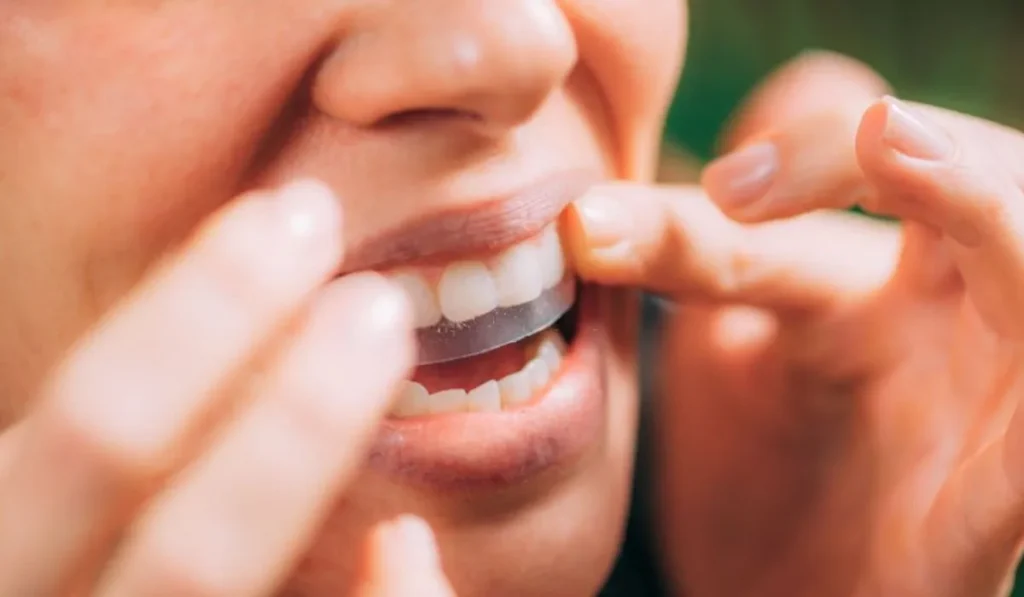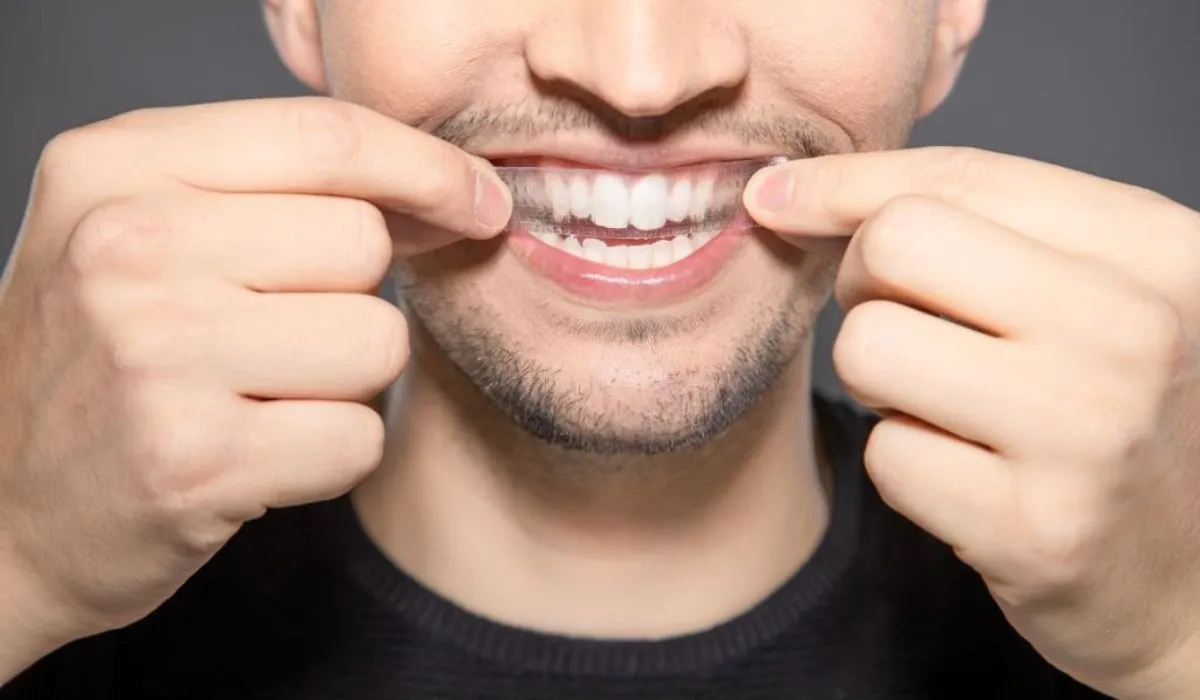Who doesn’t want a bright, white smile? Teeth whitening strips are a popular over-the-counter option for whitening teeth at home. However, some strips can irritate sensitive teeth and gums. Choosing the right product suitable for sensitive teeth is key to avoiding pain or damage.
In this article, we will first understand what teeth whitening strips are and their importance. We will then discuss how to select suitable whitening strips are for sensitive teeth, along with the best strip options.
We will also cover the benefits of these strips and tips for using them safely if you have sensitive teeth.
What Are Teeth Whitening Strips? Why Are They Important For Your Teeth?
Teeth whitening strips are thin, flexible plastic strips coated with a teeth-whitening gel containing ingredients like hydrogen peroxide or carbamide peroxide. They are placed over the teeth and conform to their shape.

The whitening agent penetrates the teeth and breaks down stains and discoloration, while also gently lightening natural tooth color. With regular use, significant whitening and brightening of teeth is achieved.
Whitening strips are important for teeth as they:
- Lighten tooth discoloration from coffee, tea, red wine, smoking etc.
- Whiten natural yellowing of teeth with age.
- Brighten teeth stained by certain medications like tetracycline.
- Reverse yellowing and dullness from fluorosis, enamel problems etc.
- Whiten smiles for special occasions like weddings or class reunions.
- Boost self-confidence with a bright, white smile.
When considering teeth whitening, strips offer an accessible and easy method for use at home.
Are Teeth Whitening Strips Suitable For Sensitive Teeth?
Teeth whitening strips use peroxide-based agents which can sometimes irritate sensitive teeth and gums. However, today many strips are specially designed for use on sensitive teeth. Considerations include:
- Look for low-concentration hydrogen peroxide (3-6%) or carbamide peroxide (9-18%) formulas that are gentler.
- Choose strips with built-in desensitizing agents like potassium nitrate that relieve pain.
- Avoid strips with higher peroxide concentrations which increase sensitivity risk.
- Seek options with enamel-safe whitening agents that protect tooth structure.
- Applying products properly and discontinuing use if you experience discomfort is important.
- Consult your dentist beforehand if you have very sensitive or damaged teeth.
With the right product and proper use, even people with moderately sensitive teeth can benefit from whitening strips.
Best Teeth Whitening Strips For Sensitive Teeth
Here are some of the best whitening strip options for sensitive teeth:
- Crest 3D White Whitestrips Gentle Routine – Contains hydrogen peroxide along with potassium nitrate for sensitivity relief. Also has enamel-safe agents.
- Sensodyne Pronamel Gentle Whitening Strips – Uses a low percentage of carbamide peroxide and lowers pH to avoid root sensitivity. Gentle and enamel-safe.
- Colgate Optic White Overnight Teeth Whitening Gel – Has glycerin for teeth protection and sodium fluoride to help strengthen enamel.
- Spotlight Whitening Two-Step System – Desensitizing strips applied before whitening strips make this suitable for sensitive teeth. Also has fluoride.
- Truewhite Teeth Whitening Strips Kit – Contains aloe vera and vitamin E to soothe sensitive teeth along with carbamide peroxide for whitening.
- Smile Direct Club Teeth Whitening Strips – Features an anti-sensitivity agent stack including aloe vera, xylitol, and sodium lauroyl glutamate, that’s gentle on teeth.
Benefits Of Teeth Whitening Strips
Teeth whitening strips offer the following benefits when used correctly:
- Effectively whiten and brighten teeth over 2-4 week treatment period.
- Easy to apply and use at home. More accessible than in-office whitening.
- Customizable treatment with ability to target certain teeth.
- Available in disposable strips requiring no trays or equipment.
- Portable and travel friendly.
- Cost effective over the long term compared to other methods.
- Gentler on enamel than higher concentration whitening products when used properly.
- Cause less sensitivity than in-office whitening which has higher peroxide concentrations.
Tips For Using Whitening Strips On Sensitive Teeth
Here are some tips to use whitening strips safely and effectively if you have sensitive teeth:
Read More:- How To Use Coconut Oil For Teeth Whitening? Brighten Your Smile
Conclusion
Teeth whitening strips can effectively brighten discolored smiles when used correctly and safely. Those with sensitive teeth can also benefit from the many whitening strips now formulated to minimize discomfort and protect enamel.
Using options with lower peroxide concentrations, built-in desensitizers, and enamel-safe agents is key. Proper application and discontinuation at any sign of sensitivity is also important.
Keep your dentist in the loop and practice good oral hygiene habits during treatment. Take the time to choose the right teeth whitening strips for your sensitive teeth so you can smile confidently.
Read More:- 5 Best Toothpaste For Bad Breath – Will It Give Good Odor?
FAQs
Q1: How Long Should I Use Teeth Whitening Strips For Sensitive Teeth?
A: Use as directed, which is typically for 30 mins to 1 hour daily or bi-daily over the treatment period. This may be anywhere from 5-20 days depending on product. Stop immediately if sensitivity occurs.
Q2: Can I Use Whitening Strips Twice A Day To See Faster Results?
A: It’s best to stick to the manufacturer instructions and not overuse whitening strips, as overuse heightens sensitivity risk. Using them more than directed does not necessarily whiten teeth faster or better.
Q3: Is It Safe To Use Whitening Strips If I Have Sensitive Teeth?
A: Whitening strips formulated for sensitive teeth containing ingredients to minimize discomfort are generally safe if used correctly under dentist supervision. But discontinue use at any sign of sensitivity pain or discomfort.
Q4: What Foods And Drinks Should I Avoid After Using Whitening Strips?
Avoid staining beverages like coffee, red wine, and tea for some hours after using strips. Acidic foods and drinks can also irritate sensitive teeth so avoid those too or rinse mouth well after consuming.
Q5: How Long Do The Results Of Teeth Whitening Strips Last?
A: Teeth whitening results from strips can last from a few months to up to a year, depending on lifestyle factors. Avoiding staining food/drinks helps prolong results. Touch up treatments may be needed every 6-12 months.

